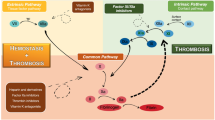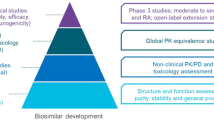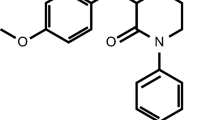Abstract
Purpose
Inclacumab, a novel monoclonal antibody against P-selectin, is in development for the treatment and prevention of atherosclerotic cardiovascular diseases. This study was conducted to investigate potential differences in the safety, tolerability, pharmacokinetics (PK), and pharmacodynamics (PD) of single intravenous doses of inclacumab between Japanese and Caucasian healthy volunteers.
Method
Sixty-two subjects (31 Japanese and 31 Caucasian) were enrolled in a single-center, open-label, parallel, three dose groups (0.3, 3.0, and 20 mg/kg), single-dose study in Japanese and Caucasian healthy volunteers. Inclacumab concentrations, platelet–leukocyte aggregates (PLA), free/total soluble P-selectin (sP-selectin) ratio, and antibody formation were measured along with routine safety monitoring during the conduct of the study.
Results
The PK profiles of inclacumab in Caucasian and Japanese subjects were similar following single-dose intravenous infusion. The statistical analysis of peak (C max) and total exposure (AUClast) indicated that bioavailability was similar for both races when corrected for body weight. The geometric mean ratios for AUClast and C max in the Japanese versus Caucasian cohort were 101 and 111 %, respectively, in 0.3 mg/kg dose group, 108 and 107 %, respectively, in 3.0 mg/kg dose group, and 97 and 96 %, respectively, in 20 mg/kg dose group. No differences were observed in the level of PLA inhibition and mean free/total soluble P-selectin ratio between Japanese and Caucasian subjects. PK/PD relationship between the free/total sP-selectin ratio or PLA and plasma concentration of inclacumab appeared to be similar in both Japanese and Caucasian populations. The effect of race as a covariate was explored on both PK/PD models for PLA and free/total sP-selectin ratio and did not have a significant effect over the reduced model without race as a covariate.
Conclusions
Ethnicity had no clinically relevant influence on inclacumab pharmacokinetics or pharmacodynamics. No dose adjustment of inclacumab is required for differences in race.





Similar content being viewed by others
References
Kling D, Stucki C, Kronenberg S, Tuerck D, Réaume E, Tardif JC, Gaudreault J, Schmitt C (2013) Pharmacological control of platelet-leukocyte interactions by the human anti-P-selectin antibody inclacumab—preclinical and clinical studies. Thromb Res 131(5):401–410
Tardif JC, Tanguay JF, Wright SS, Duchatelle V, Petroni T, Grégoire JC, Ibrahim R, Heinonen TM, Robb S, Bertrand OF, Cournoyer D, Johnson D, Mann J, Guertin MC, L’Allier PL (2013) Effects of the P-selectin antagonist inclacumab on myocardial damage after percutaneous coronary intervention for non-ST elevation myocardial infarction results of the SELECT-ACS Trial. J Am Coll Cardiol 61(20):2048–2055
Schmitt C, Abt M, Ciorciaro C, Kling D, Jamois C, Schick E, Solier C, Benghozi R, Gaudreault J (2015) First in man study with inclacumab, a human monoclonal antibody against P-selectin. J Cardiovasc Pharmacol 65(6):611–619
Schmitt C, Mudie N, Ciorciaro C, Gaudreault J (2015) Absence of pharmacodynamic interaction between inclacumab and heparin in healthy smokers. J Cardiovasc Pharmacol 65(4):386–392
Multiple ascending dose study of inclacumab in healthy volunteers and patients with peripheral arterial disease. https://www.clinicaltrials.gov/ct2/show/NCT00760565
Study of inclacumab in patients undergoing coronary artery bypass graft (CABG) surgery. https://www.clinicaltrials.gov/ct2/show/NCT01245634
Magar DE (2006) Target-mediated drug disposition and dynamics. Biochem Pharmacol 72(1):1–10
International Conferrence on Harmonisation of Technical Requirements for Registration of Pharmaceuticals for Human Use. ICH Harmonised Tripartite Guideline: Ethnic Factors in the Acceptability of Foreign Clinical Data: E5(R1) 1998.
Human soluble P-Selectin/CD62P Immunoassay. Available at: http://www.funakoshi.co.jp/data/datasheet/RSD/BBE6.pdf. Accessed May 29, 2015
Jaumdally RJ, Varma C, Blann AD, Macfadyen RJ, Lip GY (2007) Indices of angiogenesis, platelet activation, and endothelial damage/dysfunction in relation to ethnicity and coronary artery disease: differences in central versus peripheral levels. Ann Med 39(8):628–633
Makin AJ, Chung NA, Silverman SH, Lip GY (2003) Thrombogenesis and endothelial damage/dysfunction in peripheral artery disease. Relationship to ethnicity and disease severity. Thromb Res 111(4–5):221–226
Patel RT, Lev EI, Vaduganathan M, Guthikonda S, Bergeron A, Maresh K, Dong JF, Kleiman NS (2007) Platelet reactivity among Asian Indians and Caucasians. Platelets 18(4):261–265
Chiba K, Yoshitsugu H, Kyosaka Y, Iida S, Yoneyama K, Tanigawa T, Fukushima T, Hiraoka M (2014) A comprehensive review of the pharmacokinetics of approved therapeutic monoclonal antibodies in Japan: are Japanese phase I studies still needed? J Clin Pharmacol 54:483–494
Zhou H, Tsukamoto Y, Davis HM (2012) Should clinical pharmacokinetic bridging studies between Caucasian and Asian populations be required for approval of monoclonal antibodies? J Clin Pharmacol 52:1273–1276
Acknowledgments
The authors would like to thank Dr. Amina Haggag, the principal investigator at Anaheim Clinical Trials (ACT) in California (USA), for her contribution to this study. The authors also thank Julia Braggs for the operational management of the study, Dr. Kevin Smart for his scientific input on the PKPD section, Corinne Petit-Frère for analyzing the PK and ADA samples, Martina Their for organizing the analysis of the soluble P-selectin samples, Bernhard Reis for scientific input on the PLA analysis, and Barbara O’Reilly for generation of study listings and tables.
Authors’ contributions
MM and ChS wrote the manuscript. MM, ChS, and GP designed and performed the research and analyzed the data.
Compliance with ethical standards
ᅟ
Conflicts of interest
This study was sponsored by Roche. All authors are employees of Roche.
Ethics approval
The study was conducted in full accordance with the principles of the Declaration of Helsinki and with the International Conference on Harmonization (ICH) E6 guideline for Good Clinical Practice (GCP) and local laws and regulations.
Consent to participate
All subjects gave written informed consent before participating in study-related procedures.
Author information
Authors and Affiliations
Corresponding author
Rights and permissions
About this article
Cite this article
Morrison, M., Palermo, G. & Schmitt, C. Lack of ethnic differences in the pharmacokinetics and pharmacodynamics of inclacumab in healthy Japanese and Caucasian subjects. Eur J Clin Pharmacol 71, 1365–1374 (2015). https://doi.org/10.1007/s00228-015-1938-4
Received:
Accepted:
Published:
Issue Date:
DOI: https://doi.org/10.1007/s00228-015-1938-4




